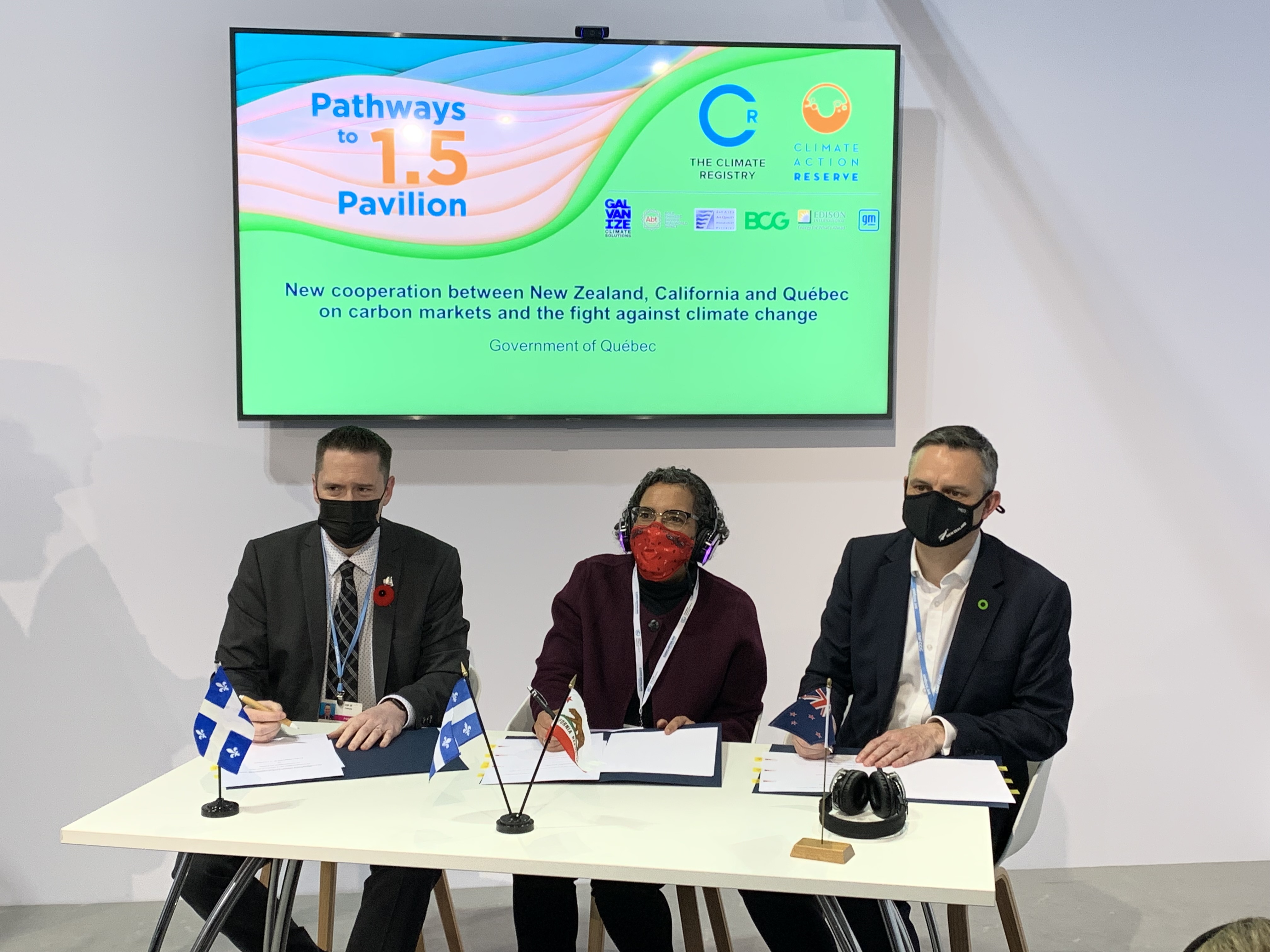At COP26: California signs joint declaration with New Zealand, Québec to cooperate in fight against climate change
Contacts
GLASGOW – At a ceremony in the Blue Zone today the California Air Resources Board, on behalf of the state of California, signed a Joint Declaration (//ww2.arb.ca.gov/sites/default/files/2021-11/Cal-NZ-QC%20declaration_EN_Final.pdf) on cooperation in the fight against climate change with the governments of New Zealand and Québec. The agreement follows the statutory requirement of AB 32 to consult with other nations to facilitate the development of integrated and cost-effective regional, national, and international greenhouse gas reduction programs.
The Joint Declaration recognizes the urgent need to reduce greenhouse gas emissions in accordance with the latest findings of the Intergovernmental Panel on Climate Change. It acknowledges the common intent of the three jurisdictions to transition toward net-zero greenhouse gas emissions while creating new, quality jobs in low- or zero-emission sectors and facilitating a just transition for people impacted by the shift towards a carbon neutral economy.And it recognizes a shared understanding of the importance of carbon pricing and the reform and phase out of environmentally harmful subsidies, as efficient and critical tools for reducing greenhouse gas emissions at the scale necessary to limit the global average temperature increase to 1.5°C.
The Joint Declaration aims to strengthen California’s cooperation with New Zealand and Québec in the fight against climate change by sharing information, experiences, and best practices and promoting the environmental integrity of carbon pricing instruments to reduce greenhouse gas emissions worldwide. It also states our shared intention to explore opportunities for potential future alignment of our respective cap-and-trade programs.

“Cooperation between jurisdictions on climate action is absolutely essential to addressing the climate crisis. We are proud to be doing so with New Zealand and Québec,” said CARB Chair Liane Randolph. “We look forward to aligning our respective climate programs where possible and strengthening and amplifying the impact of these programs in the process.”
“Québec, California and New Zealand have a common vision of the policies and measures that should be implemented to fight climate change successfully,” said Benoit Charette, minister of the Environment and the Fight Against Climate Change of Québec. “Indeed, our three governments believe in carbon markets as an effective economic instrument to reduce greenhouse gas emissions. In signing this declaration today, we are formalizing several years of sharing information, experiences, and best practices about our respective cap-and-trade systems and are looking forward to working even more closely together.”
“Climate change is a global problem that cannot be addressed by a single government acting alone. To stand a chance of limiting global warming to 1.5°C, the science shows we now have about eight years left to almost halve global greenhouse gas emissions. That’s eight years for Governments all over the world to come together and take bold actions to reduce greenhouse gas emissions" said James Shaw, New Zealand's Minister for Climate Change. “Whether or not we are successful will determine the quality of life for our children and grandchildren. This is the last possible moment before the window of opportunity for change closes, maybe forever. The success of COP26 will depend on leaders agreeing to elevate their collective ambition. I am delighted that we are able to do that in partnership with the state governments of California and Quebec. Our work together will help accelerate progress towards our shared goal of a genuinely low-carbon future.”
Background
Assembly Bill 32, approved by the legislature in 2006, directed CARB to consult with other national governments and other jurisdictions to identify the most effective strategies and methods to reduce greenhouse gas emissions and manage greenhouse gas control programs and to facilitate the development of integrated and cost-effective regional, national, and international greenhouse gas reduction programs. For the last several years, CARB has been conducting technical exchanges with New Zealand and Québec. The Joint Declaration acknowledges and seeks to strengthen this on-going cooperation.
